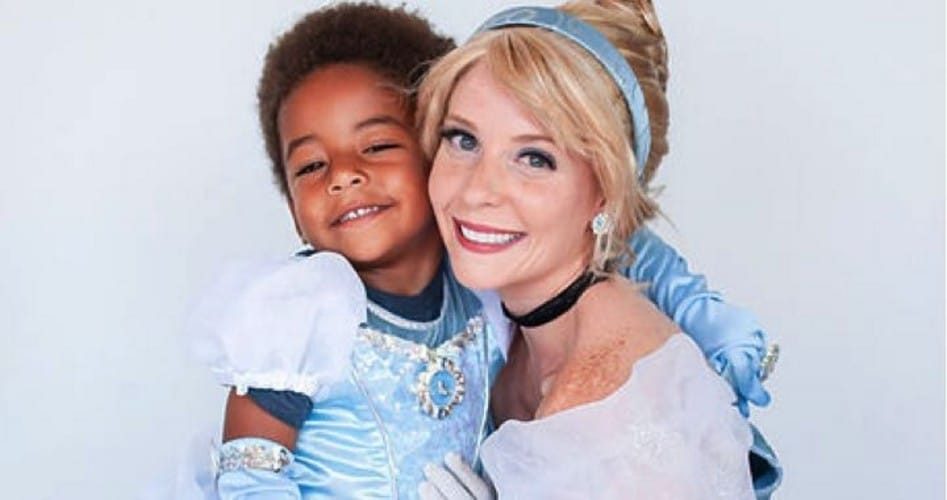
Never mind that, after getting caught up in “transgender” ideology and having “sex change” surgery, a teen had a change of heart and recently said, “I feel as if I have ruined my life.” There are still those encouraging childhood sexual identity confusion, with the latest being a Chicago photographer promoting cross-dressing among boys.
The woman, Kitty Wolf, “is offering young boys the opportunity to have their pictures taken dressed up as their favorite princess, saying, ‘the more photos of boys playing princess we put out there,’ the more “normal” it will become,’” reports the Blaze.
The site continues:
Wolf, a photographer, preschool teacher, and former owner of Princesscapades Princess Parties, says she decided to start the Boys Can Be Princesses, Too project after she noticed what she considered to be harmful masculine messaging.
On the website for her new endeavor, she recalls how discouraging it was to see “boys being told that princesses are ‘just for girls’ or that liking princesses and especially dressing as one somehow makes them weak, inferior or not boys.”
“They’re told it’s not manly, or macho, or normal,” Wolf continues. “This leads boys to feel ashamed of their interests, confused, sad, and lonely.”
“I simply feel that a child’s imagination should not be limited by their gender,” Wolf argues. “Therefore, our goal here is to show these boys and world that it is perfectly acceptable for boys to admire and even dress like princesses. I want to show them it’s ok for boys to dress up as their heroes, even if that means they’re twirling around in a ball gown.”
Do note that Wolf uses the term of choice among those operating not intellectually but emotionally, saying, “I feel” instead of telling us what she thinks. And deeper thought reveals some fallacies underlying her argument.
First, should a child’s imagination be limited by anything? If not, would Wolf’s set accept a boy’s obsession with guns? Because it’s common now for “fashionable” soccer-mom types to forbid such things. Going further, would they accept a boy’s white supremacist, KKK- or Nazi-oriented, or serial killer-like play? The point is that everyone “limits” where children’s imaginations may go — it’s just a matter of what standard is applied.
Once realizing this, that there’s no such thing as value- and limit-free child-rearing (nor should there be), one should ask: Why assume that with boys there’s something wrong with “masculine messaging”? They are the masculine sex, after all.
This rash assumption, accepted on faith and as dogma, fails to respect the Chesterton’s fence principle. Propounded by philosopher G.K. Chesterton, he stated that in “the matter of reforming things, as distinct from deforming them, there is one plain and simple principle.”
Imagine there is “a fence or gate erected across a road,” he explained. “The more modern type of reformer goes gaily up to it and says, ‘I don’t see the use of this; let us clear it away.’ To which the more intelligent type of reformer will do well to answer: ‘If you don’t see the use of it, I certainly won’t let you clear it away. Go away and think. Then, when you can come back and tell me that you do see the use of it, I may allow you to destroy it.’”
The point is that everything exists for a reason; it may be a good reason or a bad one. But until we discover it, we have no business destroying the thing.
Yet is there any indication that our social-engineering-mad enemies of tradition have thought deeply about what they’d tear down? Perhaps some psychologist somewhere, sometime, said a given innovation was an imperative, and ignoring millennia of accumulated wisdom a fallacy became a fashion. So let’s perform the examination necessary here.
Abusing the language along with the children, many today subscribe to the “gender”-neutral (“sex” is the proper term) child-rearing fad. Thus do we occasionally even see parents refusing to divulge the sex of their toddler, saying they don’t want to put him in a “gender straitjacket.”
Yet raising children is, by definition, all about categorizing, molding, and limiting. Note here that just as psychologists define “gender dysphoria” — the belief that you’re one sex stuck in the body of the other — they also define “clinical lycanthropy,” the sense that you’re really an animal trapped in a human body. Despite this, we still pigeonhole children by putting them in clothing and teaching them language, manners, and the whole range of human norms. We don’t refrain from limiting a child with a “species straitjacket” because he may one day conclude he’s a ferret.
So is it possible that just as we give a child a species-specific upbringing because he’s a human and not an animal, we should also give a boy a sex-specific upbringing because he’s male and not female? Is it possible that what has been dismissed as “sex stereotyping” was born of the recognition of the given sex’s characteristic strengths, weaknesses, and psychological needs and serves to cultivate those strengths and mitigate those weaknesses by, in part, satisfying those needs?
Note: That the sexes are innately different is not theory, but fact, as the splendid Norwegian documentary The Gender Equality Paradox (below) illustrates.
In other words, just as we might provide a math prodigy with much different interest-specific opportunities and tutelage than a music prodigy, sex-specific child-rearing (a.k.a. common sense) merely reflects the recognition of — and desire to augment — each sex’s positive natural inclinations.
Perhaps agreeing would be the site Activist Mommy, which, commenting on Wolf’s claims, wrote, “The only thing that leaves little boys confused is being encouraged to dress up like a princess.” This is no joke — and bigger boys are affected, too. Just consider teenager Nathaniel, who had his genitals removed as part of a “transition” just after his 18th birthday. Now 19, he calls the surgery a “Frankenstein” mutilation that has “ruined” his life.
Note that Nathaniel is one of many people experiencing “sex-change regret” and that the suicide rate among Made-up Sexual Status individuals, regretful or not, is very high.
This is why blithely tearing down fences, bull-in-a-china-shop style, is an intolerable act. Sometimes it means tearing down psyches, childhoods, futures, and lives.
Photo: Screenshot from Boys Can Be Princesses Too website
Selwyn Duke (@SelwynDuke) has written for The New American for more than a decade. He has also written for The Hill, Observer, The American Conservative, WorldNetDaily, American Thinker, and many other print and online publications. In addition, he has contributed to college textbooks published by Gale-Cengage Learning, has appeared on television, and is a frequent guest on radio.


